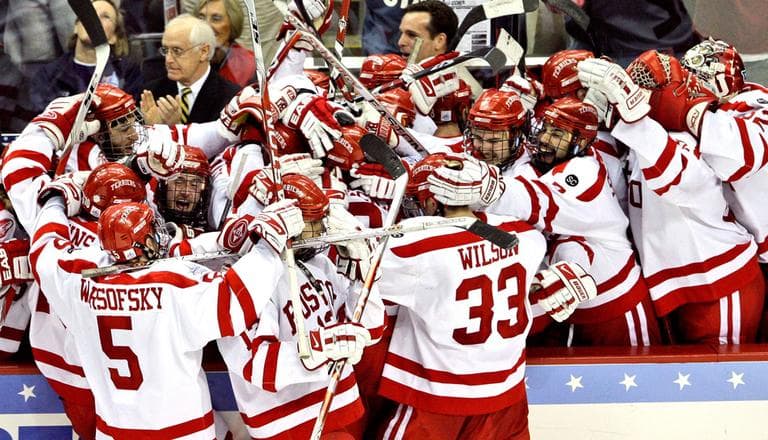Advertisement
In Depth
BU Revelations Put Hockey Under Microscope

Some may find some descriptions in this report disturbing.
BOSTON — In the 2009 NCAA championship game, Boston University scored two goals in the final 59.5 seconds and another in overtime to seal its fifth national Division I hockey title.
It was a moment that made many BU students and alumni proud. But what happened later did not. According to a confidential BU task force report leaked exclusively to The Boston Globe, after the team returned to their home stadium, players and guests drank from kegs in the locker room showers and skated naked on the ice. One student said attendees were having sex in the Agganis Arena penalty box.
Jeff Benedict wasn't shocked by the revelations. He's a special features contributor for Sports Illustrated and the author of numerous books on athletes and violence against women.
"The bottom line for these premier sports like hockey, basketball and football is that the very best players as teenagers get treated like college players used to get treated, and the college players now get treated more like pro players," Benedict said.
But in hockey, there's another factor that further sets players apart from the rest of the student population.
"If you're a basketball player, you play in middle school, you play in high school, and you play in college," said Pete Souris, assistant commissioner for public relations at Hockey East. "But, if you're a hockey player, you're likely to play in elite junior leagues in the U.S. and Canada for several years before enrolling in college. That means that the average Division I college freshman hockey player is more than 20 years old."
Souris added: "You're not with your peers, and you don't necessarily talk about the same things. You might not have a lot in common. I think it does make a difference."
Advertisement
Players can join those elite junior teams at 16 years old. And it's what happens to them while there that concerns Laura Robinson, a Canadian freelance journalist who's written extensively on sexual violence and hockey.
"Their understanding of sex often comes from the degrading and humiliating initiations," Robinson said. "They get to be the girl and they have all kinds of sickening stuff done to them. This is not a way in which you learn intimacy or love of the female body."
According to the Globe, the confidential task force report characterized BU players as participating in group sex with "surprising regularity." It wasn't a surprise to Robinson, who cites a 2008 trial at which a player testified it was common practice in Canadian youth hockey for multiple teammates to have sex with the same female as "a bonding thing."
"Her body basically becomes the skating rink that they perform on, and they perform violently on her and they do it all for each other," Robinson said.
Robinson has been criticized in Canada, where some say she's taken the bad behavior of a few and attributed it to the entire system. But she says it's not difficult to find more examples of sexual violence related to hockey. Just last month, three players from a junior team in the Ontario town of Sault Sainte Marie were charged with sexual assault. As punishment, the Soo Greyhounds sent the players to a confidential behavioral wellness program.
"As long as the newspapers in Canada continue to make these young guys into young gods simply because they can put a piece of rubber in a net, they will always get the reinforcement from the larger culture that somehow they're special and they're above the law," she said.
Like in Canada, hockey is the undisputed No. 1 sport at BU, which, according to the team's website, has sent more players to the NHL than any other college or university.
In the wake of the sexual assault arrests of players Corey Trivino and Max Nicastro last season, the BU task force made 14 recommendations to try to change the culture of hockey at the school, from better integration of players into the general student housing population to requiring yearly sexual assault prevention training.
Those measures can help, author Benedict says. But he thinks the power to change behavior lies with one man.
"The truth is that there are plenty of colleges and plenty of team sports at those colleges that do not have this problem. And I think one of the most important factors in this is the coach."
Benedict declined to speak specifically about BU's longtime leader, Jack Parker, who, on the task force's recommendation, kept his job as head coach but lost his title of executive athletic director. But Benedict says at BU and beyond, coaches need to focus on much more than whether their team is winning on the ice, field or court.
"You lose sight of the other elements of why you're a coach, which is to build men," Benedict said. "And part of building men is teaching them what is acceptable and what is not in terms of your treatment of women. That's a big part of the college experience."
BU refused to comment for this story, saying the task force's report speaks for itself.
As for the players whose arrests prompted the investigation, both were immediately kicked off the team. Charges against Nicastro were later dropped for lack of evidence. He signed with the Detroit Red Wings. Trivino pled guilty to a lesser charge and was sentenced to probation. Though the New York Islanders used their 2008 second round draft pick on Trivino, the team says it does not intend to sign him.
Disclosure: Only A Game is produced at WBUR, which is licensed to Boston University. Only A Game's Karen Given is a Boston University graduate.
This segment aired on September 15, 2012.
